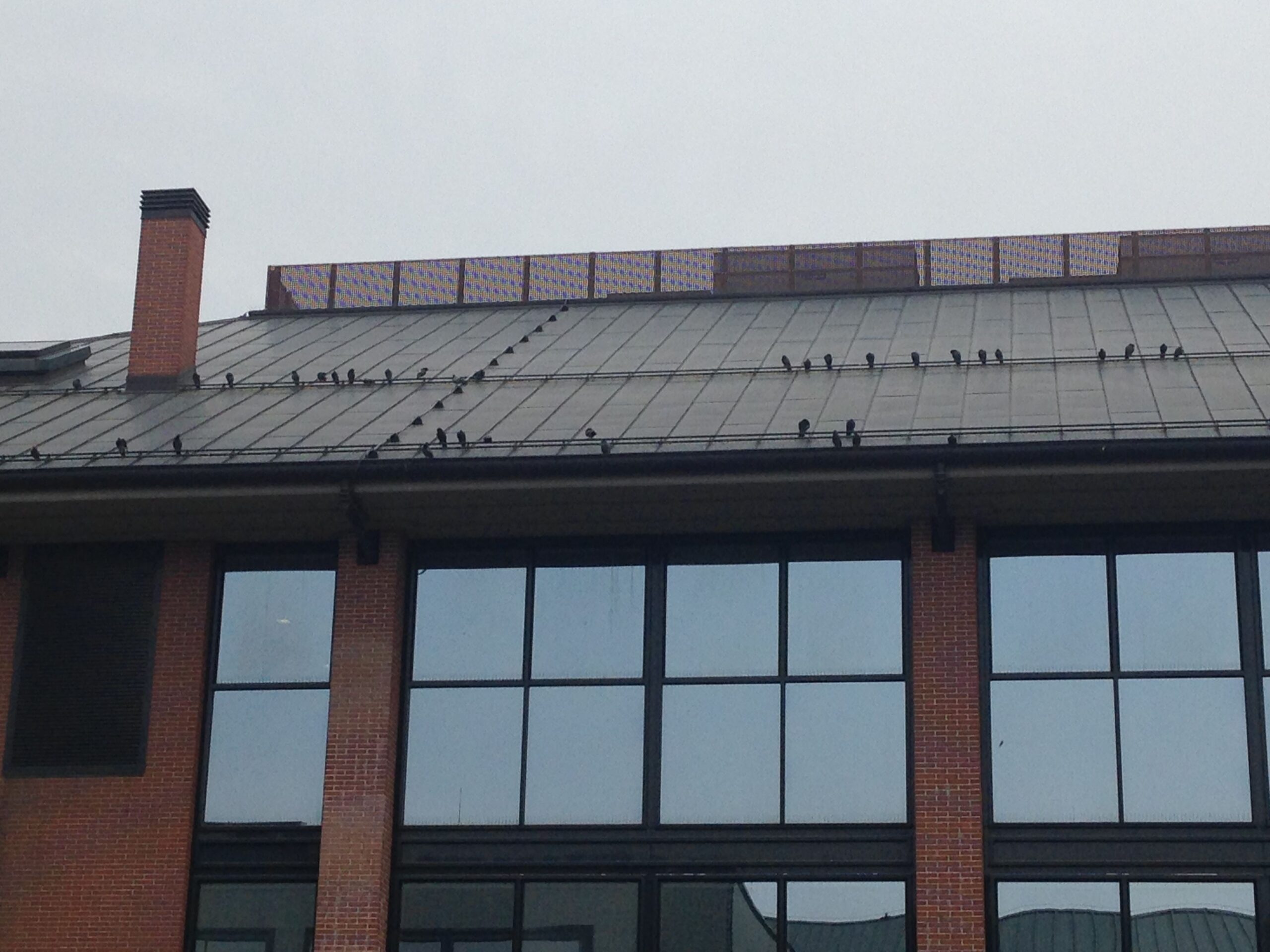Remembering and Forgiving
The destruction to workers’ health by the dampness and flax dust or ‘pource’ in the linen mills, the 1886 rioting, which produced the highest death toll of any political event in Ireland in the nineteenth century. We remember the Famine, the great paid in the United Kingdom, and we remember the violence of 1922, as well as the Outdoor Relief riots of 1932, and their brief moment of working-class solidarity. We remember that the death rate from typhoid in 1906 was the highest in the United Kingdom, and we remember the Troubles of the last more than thirty years. Part of the cultural memory is represented by Paddy Devlin’s remark that in 1930, ‘children with shaven heads, bare feet and rickets were commonplace in Belfast streets’.
All this, and much more, is remembered, but it is an expression of the sceptical, questioning, often querulous, temperament of the city, to carry both a doubt about the efficacy of possessing a cultural memory, and a doubt about the presentist, practical or pragmatic outlook which shrugs such memory off. Tom Paulin (p. 241)

Lately, often, too often, my head spins. It doesn’t just happen when I get up suddenly, though. It can happen even when I’m sitting down.
I feel like I can tame this malaise too. I feel that, like anxiety or panic, it is something sly that wants to instil a new fear inside me. Incredible, have I still not grasped that, after the most frightening months of my life, surrounded like satellites by other sublime moments of loss, hypochondria or the pointless anxieties of death will never come to me?
I never had them before, go figure that they’d come now.
New Ireland Forum: a conference of the four main constitutional nationalist parties Fianna Fail, Fine Gael, Labour and SDLP. Sinn Féin was excluded because its support for violence… It was the first stepping stone on the yellow brick road to the Downing Street Declaration of 15 December 1993 made by the British Prime Minister John Major and Taoiseach Albert Reynolds.
The Forum report was published on 3 May 1984 and made three alternative proposals. The first was a unitary thirty-two county state, which was unlikely in the current situation, the second was for some kind of federal arrangements, and the third indicated a joint authority in Northern Ireland by the British and Irish governments. These propositions were rejected by Thatcher on 19 November 1984. ‘Out! Out! Out!’ S. M. (p. 120)
I’m surrounded by hypochondriacs.
I don’t know if it’s me that attracts them or if it’s a universal reaction to the successful propaganda of pain removal. The more you remove, the more fear grows inside you.
At the smallest acceleration of your heartbeat, you go straight to cold sweat and ineffective breathing. At that point, fear comes out with all its irrational power. You are dying.
Nothing can convince you otherwise. And yet it’s so obvious that you just drank a coffee – which you almost never drink – on an empty stomach and you have some gastritis. It’s so obvious that the weather is really hot and the air is heavy and humid, that your heart inevitably must reset itself.
Is it possible that we are so out of sync with the body that we pass from conviction of its absence to its presence only as a death threat?
The Anglo-Irish Agreement (AIA) of 1985…. Unionists reacted negatively… S. M. (p. 121)
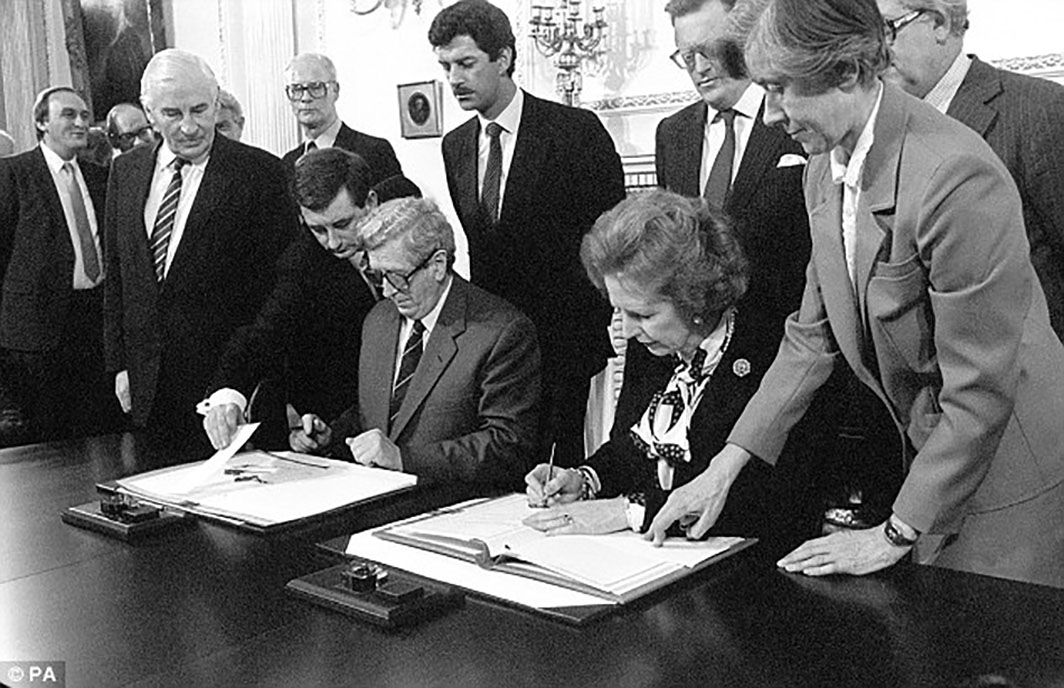
In the end, I decided to give a fake number. I asked for a pen and paper. Astonished at my positive answer, they carried out what seemed almost like an order and then went away satisfied, convinced that the day after I would respond to that phone number.
This happened at night, often at Trafalgar Square, I think, where I waited for the bus, alone, ready for a bus trip that sometimes seemed eternal, but often satisfied by my night out. Never really drunk, especially after that one night that I watched the bus pass in front of me twice and managed to miss it twice.
I believe that was the moment I decided to never again go to too much excess.
It’s like I saw the exact line bordering the dangerous red zone, and I stopped.
Yes, London, after my high school exams, alone, for a few months, definitely helped in this.
Since then, I’ve not once gone around without some form of ID, after passing out in a bus that was too hot (a summer as hot as Rome… and I had gone for the cool weather!), due to beer and certainly a long stay under the Camden Town bridge where there is a guy who wanders around, asks for a cigarette, rolls a joint, takes two hits and leaves it for you, going away. It’s not a legend. Or maybe it is? Someone else mentioned to me afterwards that they had heard of that same episode happening. A story that circled and made it back to its teller?
Anyway, I felt ill afterwards and the guy had the opposite effect: instead of going back to ask him what it was, I didn’t smoke – almost – ever again. I’m terrified of it. It was the only time in my life that I passed out, that I lost control completely.
The socio-linguistic and political circumstances in which Irish has survived in Belfast are distinctive; a small organic Irish-speaking community within an urban network of language learners within a large disaffected Catholic / nationalist minority with a high birth-rate in a Protestant / unionist city in an unstable Protestant / unionist state within a Catholic / nationalist island. Aodán Mac Póilin (p. 129)
The arrogance of the names some men think they can call us forever just because they got away with it once… we are the ones that did you a favour! Calling us “Baby” or “Honey” is unpleasant because it assumes a possession that no longer has any place and probably never did.
The Downing Street Declaration, eight years later… could not have taken place without the preliminary talks between John Hume and Gerry Adams who had become president of Sinn Féin in 1983. Adams was a Falls Road Catholic, interned in 1971 but released in 1972 to take part in the talks with Whitelaw that led to a brief ceasefire.
The man was prominent in persuading the PIRA to become a participant political party.
Adams needed to persuade his people that just as they could not be defeated, equally they could no twin. The seizure on 31 October 1987 by the French of and old ship, the Eksund, with an Irish crew, containing 150 tonnes of armaments, including guns and the new Czech explosive Semtex, made it clear that Colonel Gedaffi of Libya was the PIRA’s chief supplier. When it was further established that this was the fourth such cargo it was obvious that the PIRA had enough material to carry on war without end. S. M. (pp. 121-122)
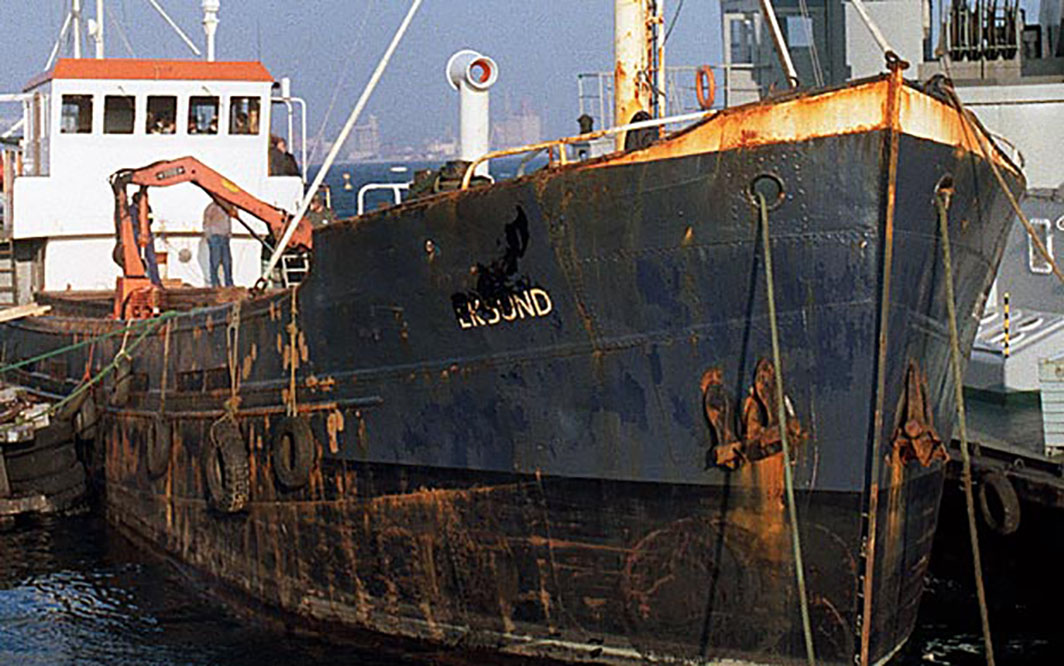
Slowly, I taught my mother to love orchids. She hated them, like she did so many other brazen flowers. They inspired a reaction of irrational fear in her. Today, though, she loves them, or at least she has learned to accept them, from seeing them at my house, from bumping into them. Unfortunately I did it, I had to do it. And I know I made you suffer.
Isn’t it said that one has to kill – metaphorically – one’s own parents in order to progress?
I saw too much repressed desire and clear reactions of fear to every one of my curious questions.
I remember clearly the first time I ever asked my mother about that gift between my legs.
We were in the car, coming home from my fantastic, colourful, elementary school, full of greenery, – the legendary Parco dei bambini. And I think, out of nowhere, I asked her why I had felt a strange sensation down there.
I remember her profound embarrassment and her ability to skirt the issue.
But why didn’t you just try to explain it to me then?
And my discovery was so healthy and genuine.
Unfortunately, this meant, for me and for you, a continuous face-to-face with my sexuality that screamed to be accepted.
It had to pass through discoveries in the act, hidden visits to the gynaecologist and two operations; honestly dear, thanks to your negligence. One saved me from having problems in the future; the other, well, the other… I’m still working on it, given that I had to admit how, deep down, it was one of your requests.
I had to pass through hate and anger to be able to free you, but since then I am ecstatic and you can, finally, grow orchids.
On Sunday, 20 March 1993 ‘shopping’ bombs in litter bins in Warrington killed among others two young boys aged three and twelve, and caused such a wave of disgust in both Ireland and Britain that it is believed that PIRA chiefs warned local activists against attacks that would prove politically disadvantageous.
Even as late as 15 June 1996 a ‘mainland’ target proved irresistible: a bomb wiped out much of the city centre of Manchester injuring 250 people. S. M. (pp. 127-128)
NAUSEA [Compulsions]
As usual, like any romantic passenger, I have the window seat. Next to me, I have an American couple. One is reading on a Kindle, the other goes back and forth between a paperback book and iPad games. Completely immersed in these activities, they don’t realize that for three straight hours they graze like herd animals. Crisps, sweet snacks. The flight attendants come by and they take about 10 minutes deciding what to get. They discuss as if they were involved in a high-risk diplomatic undertaking. They order. They don’t care that they’re spending three times as much as they’d spend on the ground for the same things. Then they return to silence, reading, playing and grazing, continuously. Physically, they’re actually thin and good-looking but it’s just that contradiction between their appearance and what they eat that I find disgusting. I was nauseous for hours after we landed. I pictured them slowly turning into two armchairs, not at all conscious of the universe moving around them. These are choices some make. No, my nausea is driven by the fact that, unfortunately, they’re not even away that they’ve made that choice.
One of the constituent elements of dust is soot; another, ash. ‘Ashes to ashes, dust to dust’. The combustions of the city contribute their share to its overburden. Not just the bonfires…; not just the output of domestic and industrial chimneys; but also the slow fires of rubbish-tip, burning-ghat, and crematorium. A. R. (p. 15)
NAUSEA [Depression]
I was so happy with my plan. What could be better than visiting my little nephew, full of energy, vitality and curious smiles?
As soon as I open my door to go, I have an urge to vomit. I get over it and, laboriously, tread towards my sister’s house, fighting against this lead in my chest and stomach. An infinite gravity.
I gag again as soon as I open the elevator door on the floor where my nephew lives. I get stuck, I lean against the door… I start to have trouble breathing…
Then my smiling nephew opens the door and, full of timid curiosity, yells: “Auntie!”
The nausea slips away. I did it!
In different quarters of the City, the colours commanding local loyalty are often daubed on the walls, the roadways, the individual kerb-stones. Some, and these do not flaunt their colours, are genuinely secret societies; others say they are open societies with secrets; other again assert that they are hermetic religious organisations. A. R. (pp. 17-18)
All, capable of striking man, woman or child very dead indeed; just as dead, indeed, as lies within the capability of nuclear explosion, or cholera, or hypothermia, or an agonising cancer of the bowel, or just old age: for dead is dead is dead: and we shall all, without doubt, be dead, sooner or later.
But: sooner: or later? That is the question. Because in most other places, people prefer later; but here in the City, a good many people express a preference for sooner; at least, insofar as concerns those whom they do not like. A. R. (p. 25)
NAUSEA [Addiction]
This strange attraction towards everything that hurts. It’s no longer curiosity, it’s not longer fun. At a certain age it’s real addiction.
Whenever I catch, in a fleeting glance of a friend, a trace of revelry that’s kept him awake for more than 24 hours, my stomach twists. My mind returns to certain scenes, to certain conversations, to certain almost film-like “classics” when you feel like a kid, even though you’re convinced you’re an adult. The not knowing how to say no. But today it’s so easy. So why does it hurt to see you like this? How can you not see yourself? They call this escape from reality. And so it is, indeed. I can’t and I don’t want to help you. It’s already too painful to see you like this. I’m afraid that your mind will soon give way and there will no longer be room even for the conversations with a clear call for help, which you allow yourself every once in a while. I can’t help you until you run away. I can’t afford to chase anyone any more. Look, stop. If you turn around I’m right here behind you.
But for those with well-tuned ears, there are other things to be heard.
The sullen crash of a bomb.
The sound of shots, near or far, and then perhaps the sound of answering shots.
Home-made mortar bombs,…
The sharp crack of nail-bomb, blast-bomb, pipe-bomb, booby-trap.
And, by way of accompaniment to all these sounds, the clanging bells and screaming sirens of ambulances, fire engines, security vehicles…
Not all these sounds are to be heard every day; or even, very often; yet, too often. A. R. (p. 33)
Can of lemonade-beer, DJ Shadow, theatre, two hours on the couch, fancy dress parties, bunker, cibucka, 1977 surrealism, either artist or madman, work or you’re out, Czech fast food, glasses, lenses, blurry, “I didn’t see you”, bars, DJs, bars inside the apartment, factories, flood, gypsies, “where am I now?”, silk-screen, Eliska, Gustav, Ivosek, Jacob, shelves, “you should have told me”, teknival, Lars Von Trier, psychoanalysis, Marxism, Jan Svankmaier, non-touristy Jewish cemetery next to the TV tower, games in the square with paper, incomprehensible sentences, sleeping in the car… but it’s not a car…, happy neighbours, spying neighbours, Czech nationalism, names of the months created by a poet, the leaves that fall, Prague-Hamburg-Rome, “love… no?!?”, “sorry”, drinking whatever is in the glass closest to the bed in the early morning, tent with the fish man that folds the branch, there’s no light, dressing in layers: t-shirt, sweatshirt, jumper, another sweatshirt, jacket, hat, but baggy and holey jeans… the jeans, the jeans didn’t exist, ticket controllers on transport, no, in the tube nooooo, I can’t… he’s coming, you defended me, you were right, nothing, cultures too different, my pasta, your pasta: onions (that as a child you ate by the mouthful instead of apples), all kinds of beans, tomato pulp, tofu, cream, more cheese, fresh tomato (what do you mean fresh…?), “do you fry olive oil?” Radio 1, Russian soup, “it’s up to you, you choose, it’s your trip”, “if I remember I’ll bring you slippers”, “it’s cold here”, “if you’re cold here, never mind there”, houses with gardens, pilings, tram drivers’ houses, HOME, “which home?”, compulsive shopping, resignation to globalisation, from here to Venceslao Square they want to make a single street full of shops, everything will disappear, “there we had an exhibit”, the posters of Ivosek everywhere, center-center, that he’d never conjugate the third person, attempts in vain to pronounce díky, the woods, villas, fountains, cemeteries, onion domes, hills everywhere, weeping willows, knees, eyes, teeth, bruises, the pirate and a frightened Smurfette, words words words words words words, no bicycle, the multi-floored club, Toy-box, everything translated and explained, Avant-Garde theatre of the 1980s, puppets, my acquired grandparents, French-Czech pronunciation…
But all this is partially redeemed by the fondness of the citizens for paint. As previously remarked, each faction has its own identifying colours, and provided the observer has been trained to interpret the colour-coding, there are few places in the City where he need be long in doubt as to the sympathies of the locality. At the appropriate seasons of festival, gaily painted banners (their poles sometimes surmounted by wreaths of emblematic flowers) are escorted through the streets. Flags, gonfalons and pennants are hung from the house-fronts.
At all seasons, there are to be seen crudely painted kerb-stones, cabbalistic signs and exhortations on the carriageways, ritual emblems painted on gable walls.
Some of these paintings are tribal – their iconography, like their execution, is primitive and unsophisticated; but they are vigorous, colourful… A. R. (p. 34)
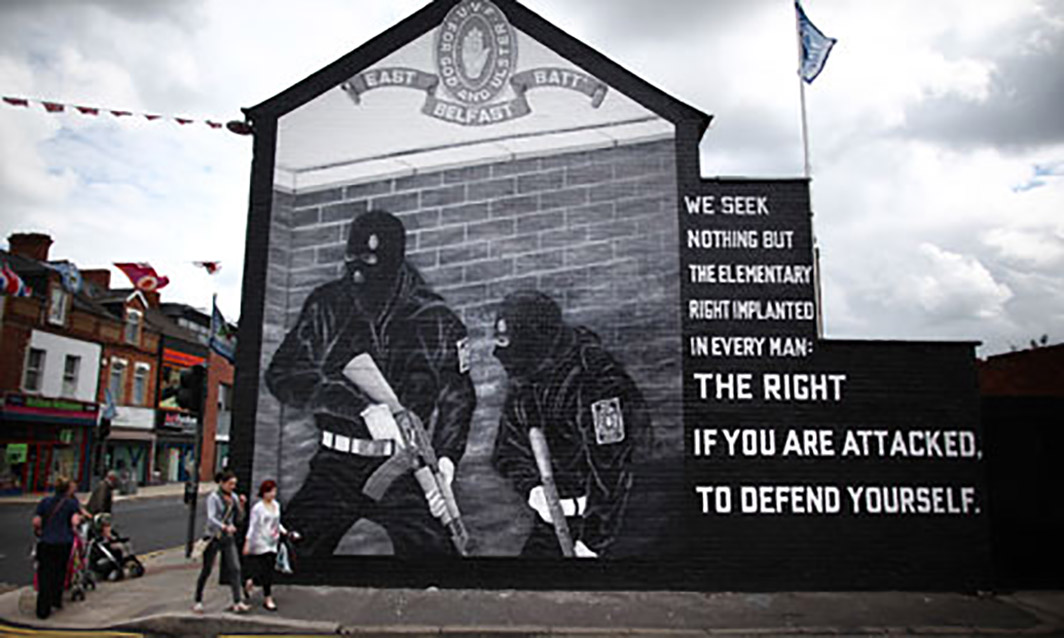
Others, however, are the work of more skilled hands – usually, art students; and represent, with embattled realism, scenes from local mythology, hagiography, or military history. The artwork is often supplemented by letterpress – exhortation, abuse, piety, vindictiveness; threats, aspirations, objurgations, manifestos. Many of these messages reappear as aerosol-brushed or crudely scrawled slogans on whatever vacant surfaces may offer themselves throughout the City. A. R. (p. 35)
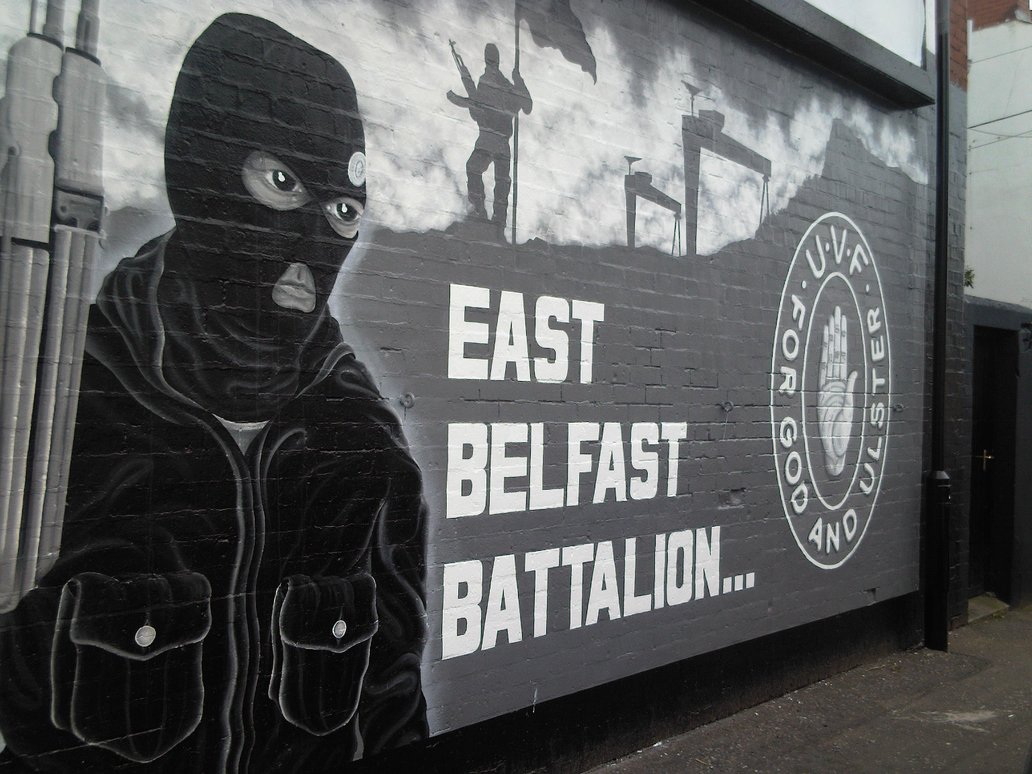
There is always, of course, the ever-present green-grey-blue scrubby backdrop of the surrounding hills. A. R. (p. 35)
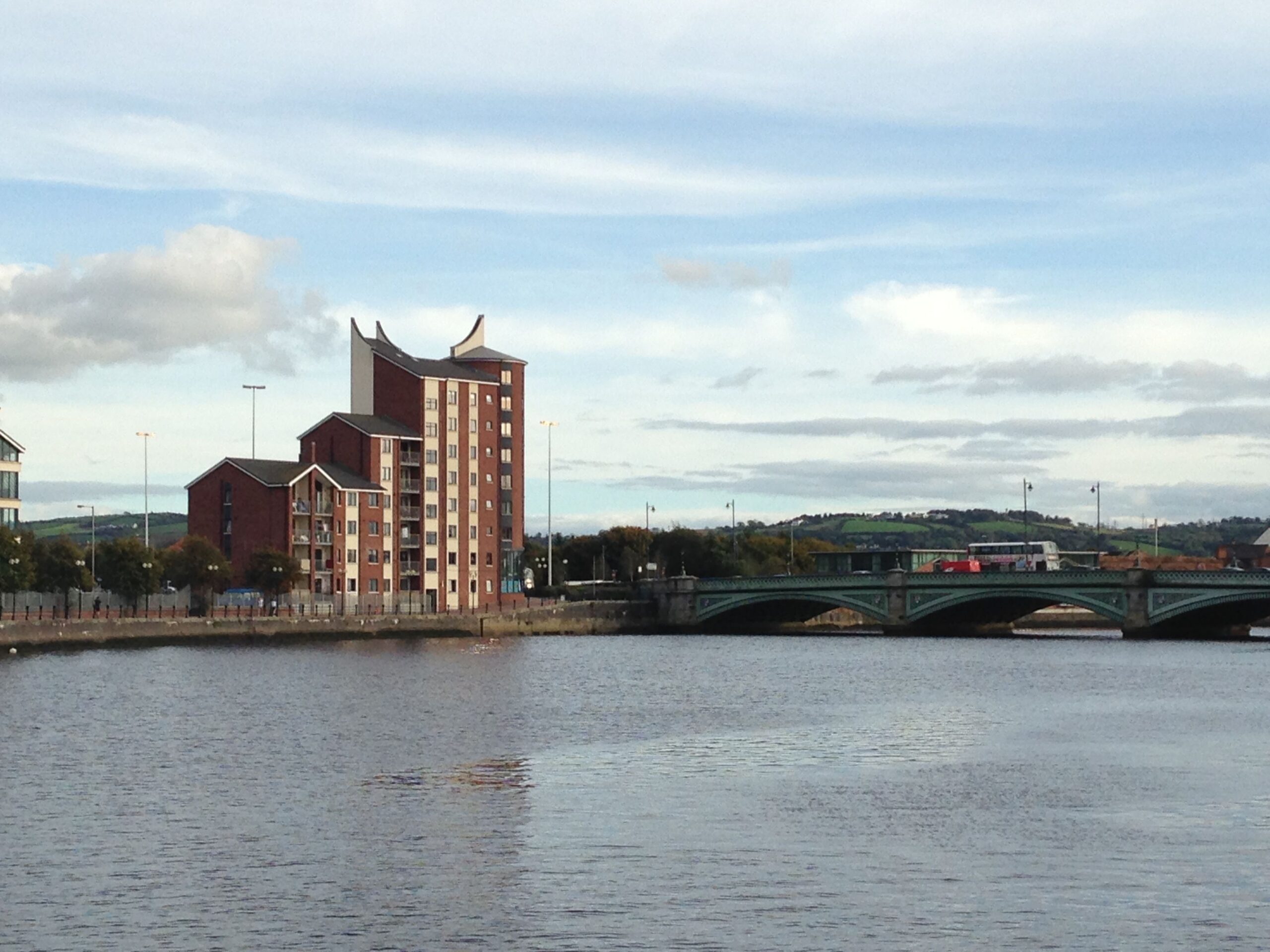
Belfast 2013.
After turning onto my home street, every pothole, every parked car, every door, together with the early and violent darkness of the time change, hurt my eyes and hit me like poisoned arrows, clouding my mind and senses.
I knew where I was but I didn’t know when any more. How old was I? How much time had passed since the last time I had felt this way? And moreover, had I ever felt this way?
The dizziness caused by this violent sensory vision – which Proust probably would have appreciated but certainly feared greatly (it’s not exactly involuntary memory; here various pasts merged into one single present, without a future) – suddenly joined pain together with pleasure, with joy, and captivity with freedom.
The principal recreations of the people are, in order of estimated popularity, watching television or videos; preaching or practising religion; copulation; and (despite the prohibitions of the Prophet) indulgence in alcohol. A. R. (p. 38)
On a shiny, red Plexiglas catwalk, dressed in black leather with an upright posture and confident gait. So they saw me, so they dreamed of me, so I really am.
So: what then? If this is a story, has it an ending? If this is a riddle, has it an answer? If this is an enigma, has it a solution? What is to be the fate of these extraordinary people? A. R. (p. 43)
We were in school, in the countryside, isolated, divided into groups. I was coming down the stairs, back from a boring lesson, a lesson about responsibilities – and I see a teacher with his students running like children out of the classroom in front of me. He, the teacher, is bare-chested; a chest shaped the way I like. His face is animal-like; he’s a kind of ram, white with horns. I’m terribly attracted to him. In fact, I get wet. And the same happens to me even now, as I’m writing it down. This dream, this desire, this reality around the corner, never spoken, never written, never thought, only dreamed.
The Downing Street Declaration indicated a tremendous leap forward on the part of the two governments and both John Major and Albert Reynolds must be seen as significant peacemakers. Their joint statement comprised five principles that finally reconciled Republicans to the idea of talks that would lead to a ceasefire, and convinced constitutional nationalists that things were moving in the right direction. Unionists needed more persuasion…
The active search for solution known as the ‘Peace Process’ began its lumbering advance.
Town centres became alive again, most notably in Belfast. S. M. (pp. 129-131)
A Parades Commission, set up in March 1997, to determine whether contentious parades should take place, demanded that the 1998 Garvaghy Road march be re-routed.
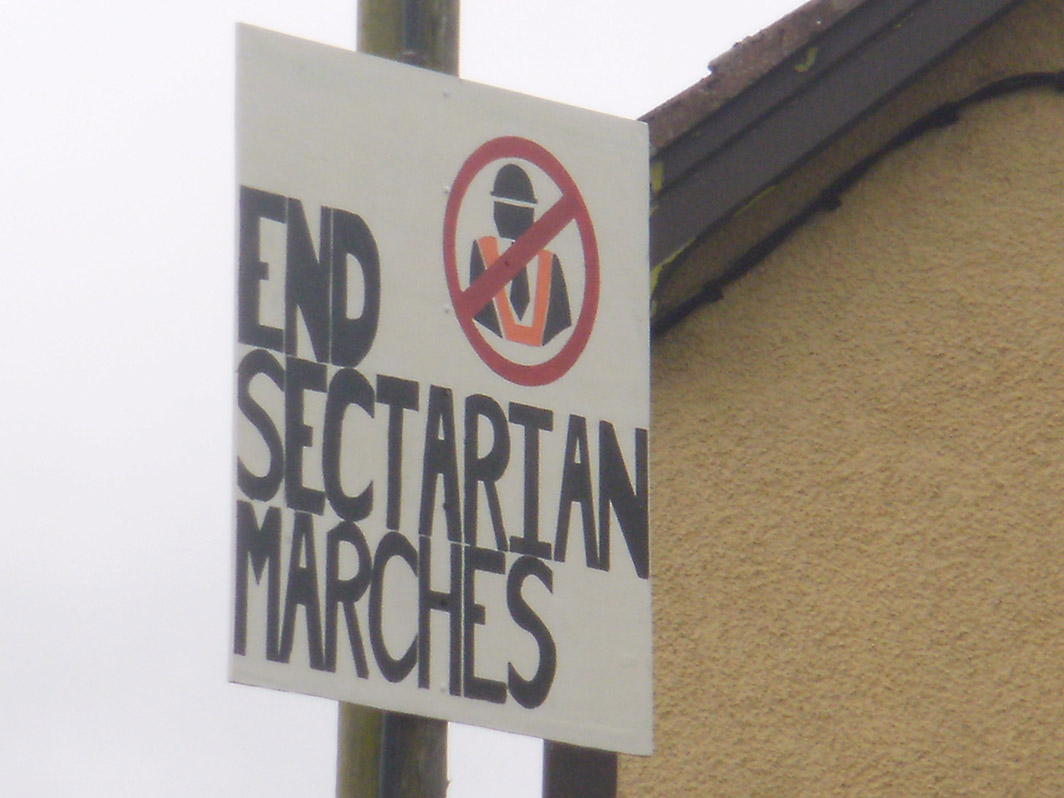
The deaths of three Catholics children in Ballymoney after a loyalist arson attack were blamed on heightened emotions over Drumcree. S. M. (pp. 132-135)
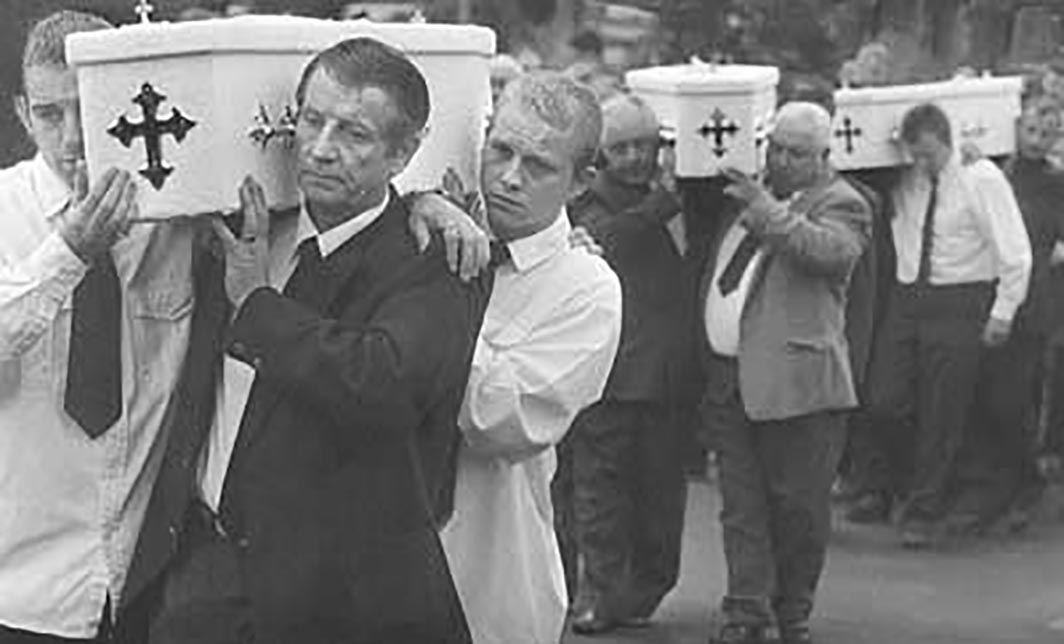
I gave myself some rules. Simple but strict.
To avoid those pointless fears that I absolutely didn’t want to be dominated by, like everyone else.
To counteract the nausea that reappeared without fail a few seconds before carrying out any plan I had made for myself.
It turned up to try to keep me from succeeding. But instead, it did not succeed.
By walking, I discovered many dark, hidden corners.
From walking, now I’ve moved on directly to dancing, but this is another story, full of light and lightness.
Tony Blair had such a majority that he had no need to depend on Unionist members, and already he had formed an ambition to seek the final solution of the centuries-old Irish Question. His joint announcement with Mo Mowlam on 30 January 1998 of the setting up of the Saville tribunal into Bloody Sunday greatly increased nationalist confidence in the new regime. This was one of the positive results of a new PIRA ceasefire that came into force on 20 July 1997. S. M. (p. 135)
Finally I was able to spend some time in Belfast, without rushing.
I put down my bags, grabbed the keys and went out.
So began the small, big discoveries, full with ice cream trucks that announced their approach with musical tunes, children on the street, ladies with typical Sunday hats, men with dogs that smiled and waved at you, parks, backstreets with garbage bins, the sudden changes from working class zones to more residential ones… the long twists and turns to get to the other part.
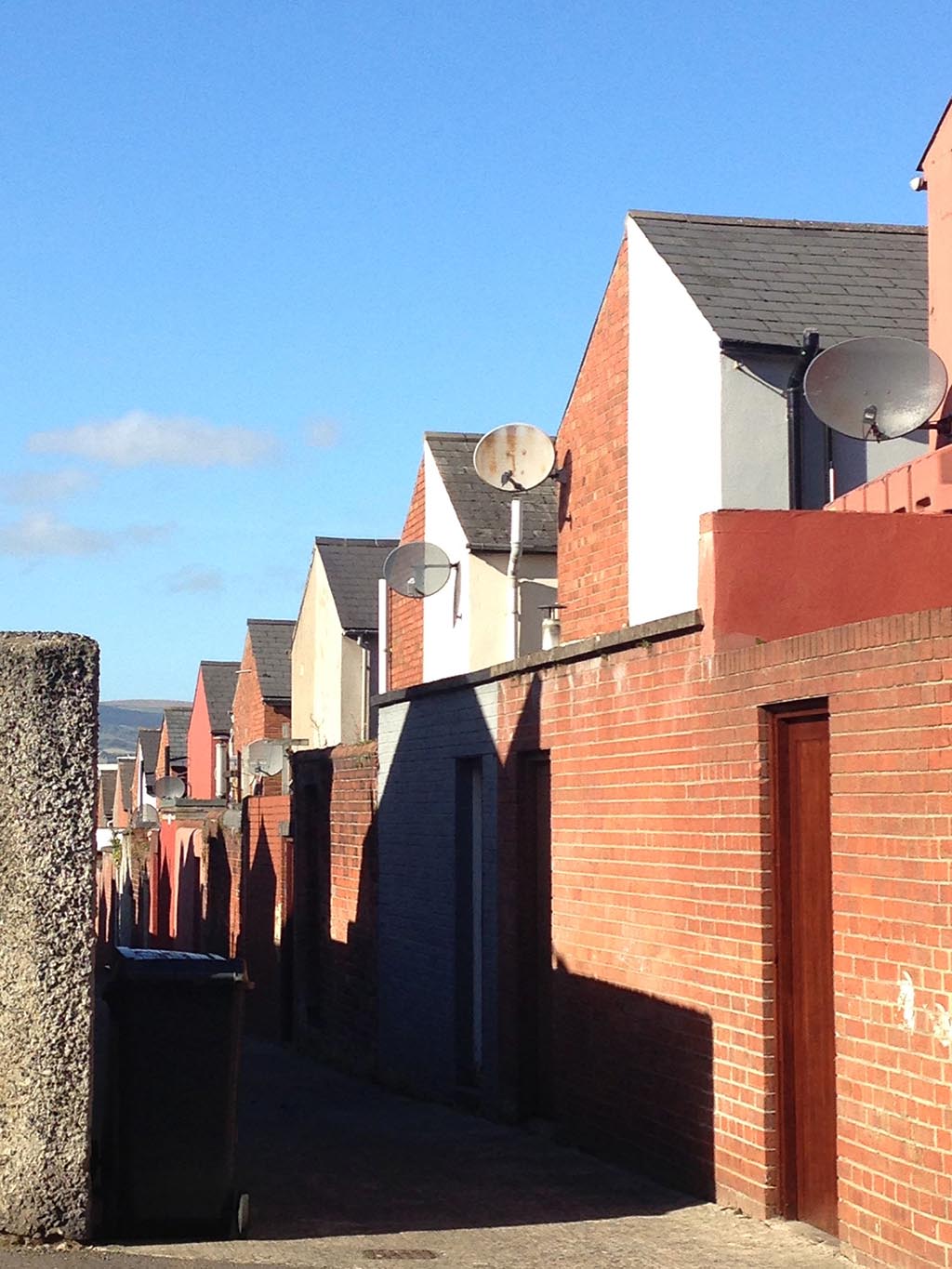
Belfast 2013.
There are a thousand obstacles. There are a thousand shortcuts that you feel it’s probably better not to take. There are myriads of photos that I felt I should not take. My excellent orientation, here, had to go along with intuition.
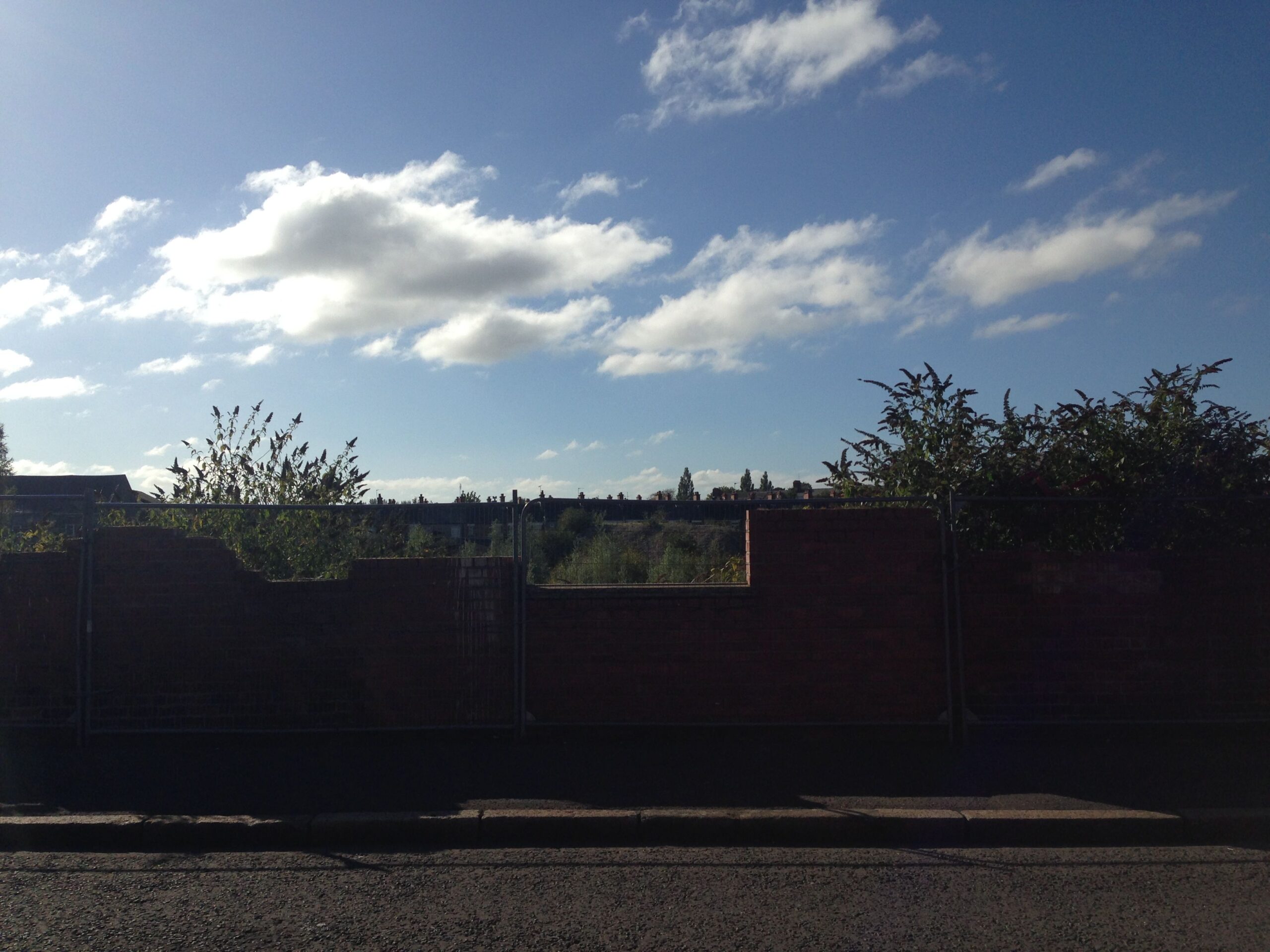
Belfast 2013.
Blair, (…) set 15 September as the date for inclusive talks, with May 1998 as the deadline for agreement. He also announced the setting-up of an international body to supervise the decommissioning of Republican and Loyalist arms under the chairmanship of the Canadian general, John de Chastelain. It was Mitchell who nominated 9 April 1998 – Holy Thursday – as the final date. In fact when the Belfast Agreement was finally signed it was five o’clock on Good Friday.
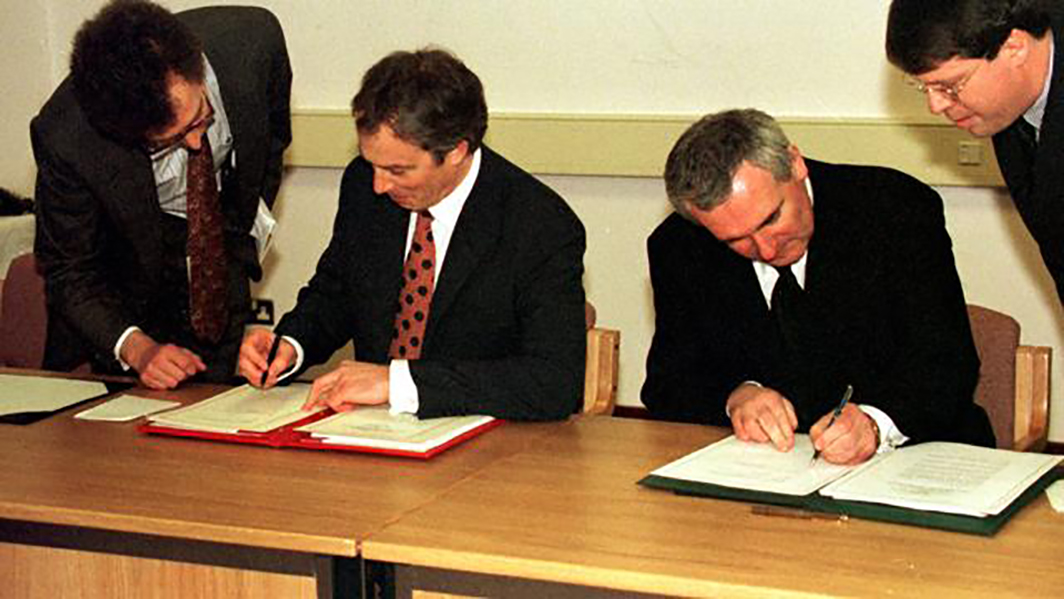
For a start Paisley and his DUP, soon to become the largest parliamentary party, walked out of the conference…. The PIRA as well. After a meeting in Gweedore a breakaway group was formed assuming the mantle of the ‘Real IRA’ and joined the ‘Continuity’ IRA in carrying on the ‘armed struggle’. The most notorious of their actions was the Omagh bombing of 15 August 1998.
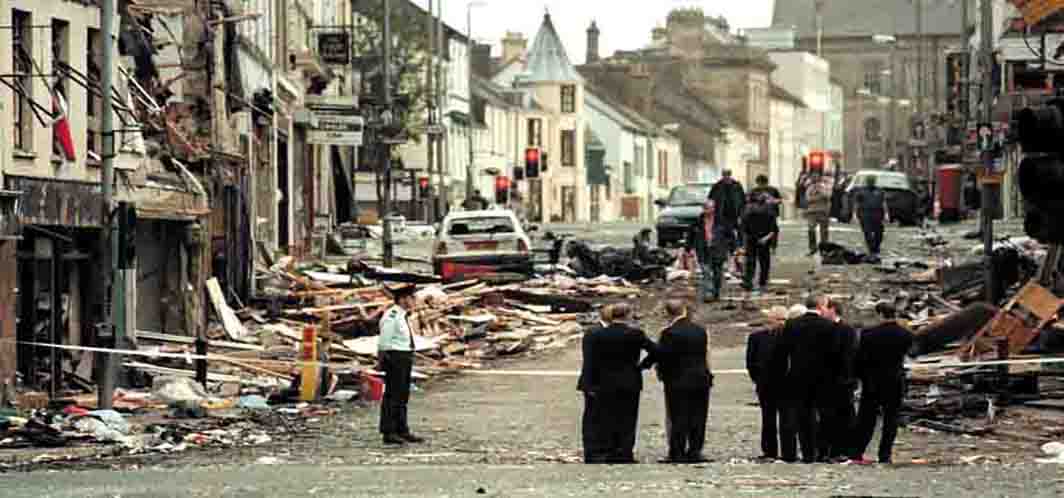
Over the next nine years there were to be many go-slows… S. M. (pp. 136-137)
I only had the courage to enter certain small residential areas when I was with a local.
But that meant passing over the gap of memory and I felt that our path tread slowly on a barely-healed wound. Yours. And among all those memorials and false windows I instead relived my first anniversary.
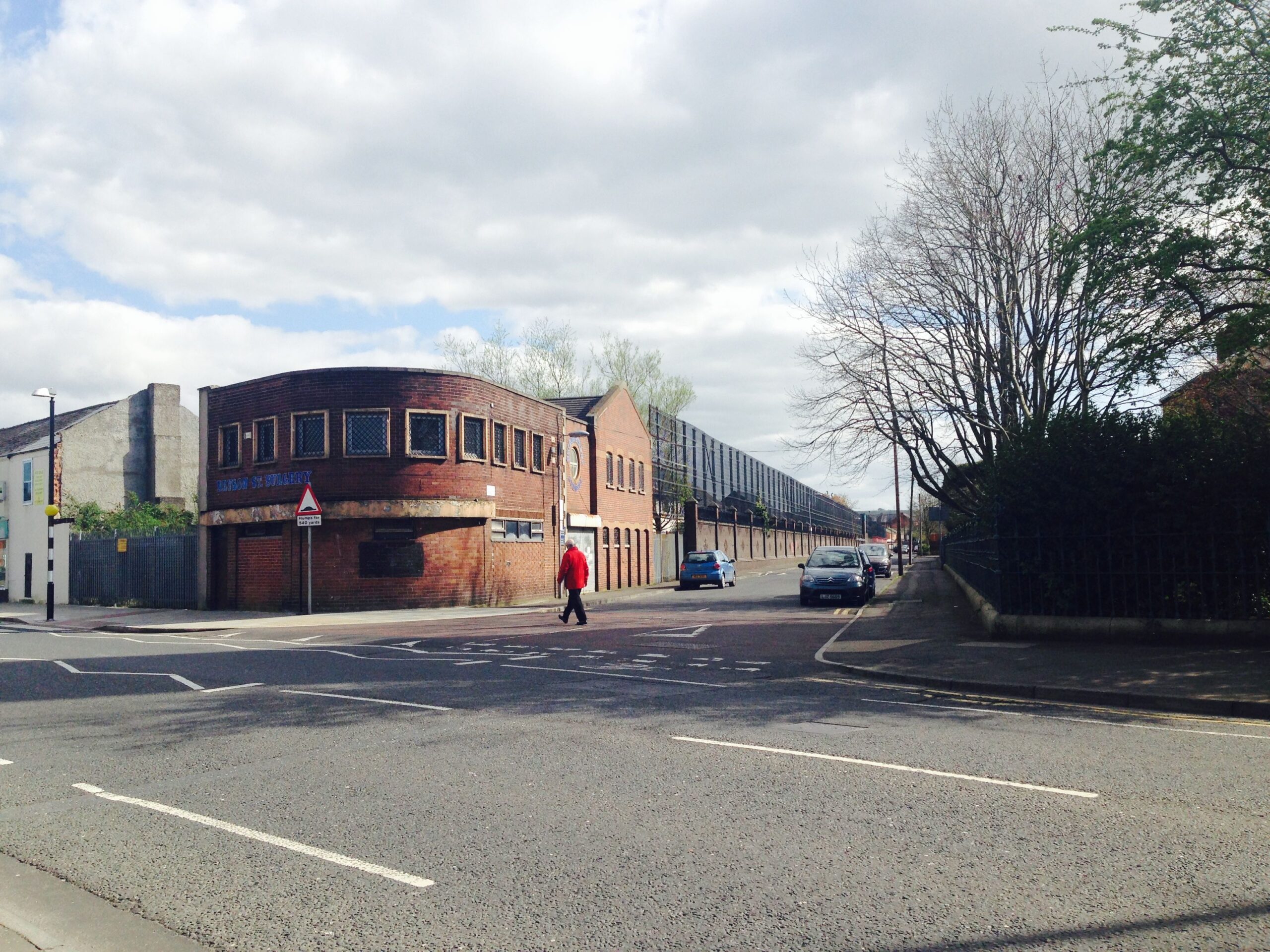
A long Wall, East Belfast, 14 April 2014.
“But could I have crossed that little park alone?”
“Well, yes, but with speed and confidence, as if you knew exactly where you were going.”
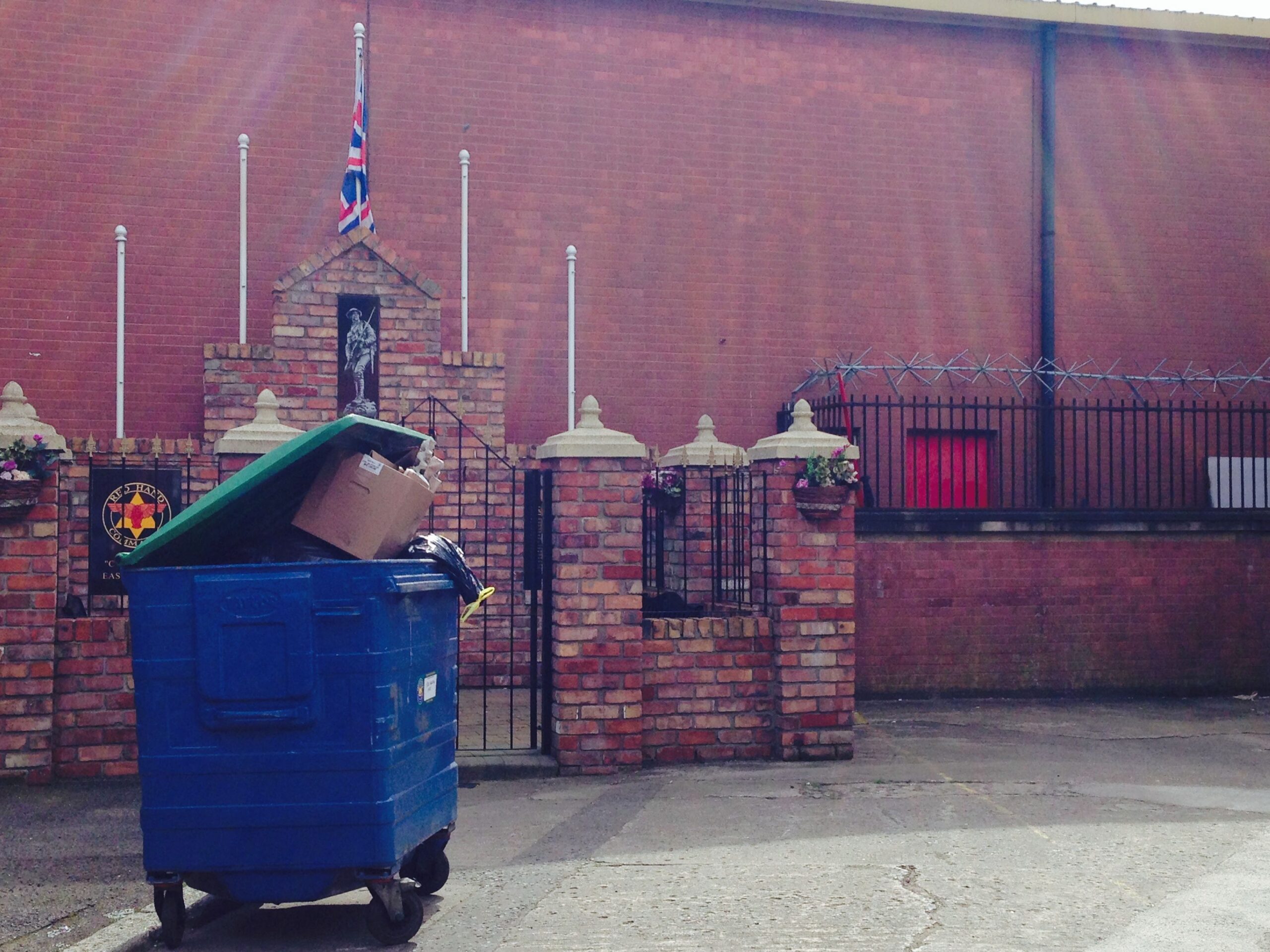
East Belfast, 14 April 2014.
With a reassuring report from the International Monitoring Commission on 30 January 2007 that criminality had virtually ceased Tony Blair and Bertie Ahern were able to announce that elections for the assembly would indeed take place – …- on 7 March 2007 with the first meeting of a few power-sharing assembly on 26 March. S. M. (pp. 139-140)
We thought it would be easy.
We slipped along the chasms of our memories, trying to superimpose new ones, together. We came out bruised, incredulous that we were still here, incredulous that time could still be so fierce, incredulous to find support in a stranger. I hope that you, like me, have at least felt the warm embrace that connects us and I hope you can smell the scent of a sweeter future.
Happy to see you walk away with apple pie from the best bakery in East Belfast, which survives to this day, for you and for your family, to reassure you that the good has remained; you’ve survived and I’m honoured, happy, thrilled to have had the privilege to share something so deeply.
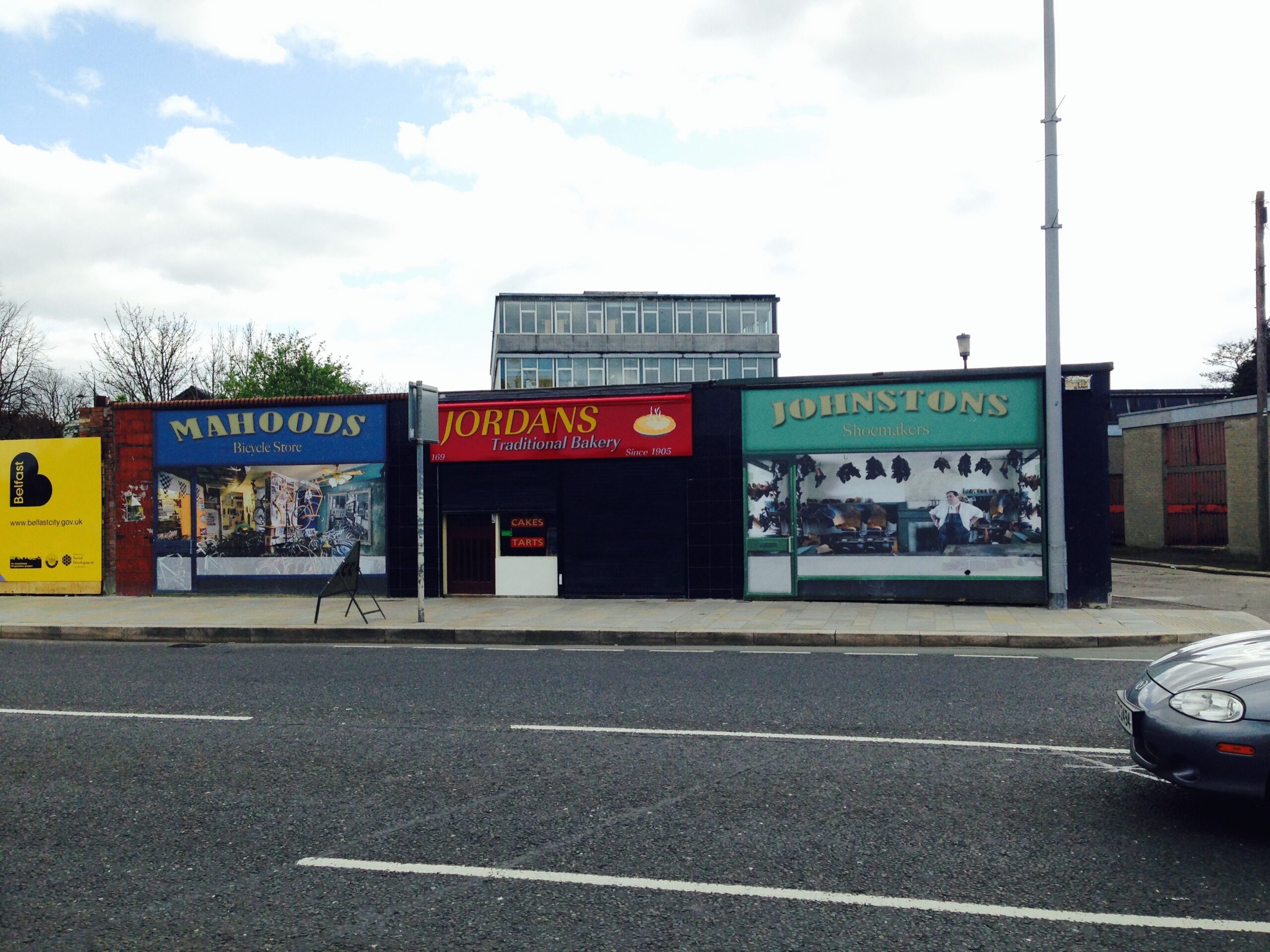
Jordans Traditional Bakery, East Belfast, 14 April 2014.
Jimmy McKenna is a man in his sixties that lives in Augher, a town in the area of South Tyrone, in Northern Ireland.
Going along Greagh Road just outside of Augher, McKenna stopped at an enormous hole, about twenty metres long and four metres deep, that British soldiers and the local police had dug right in the middle of the street.
“This is the border between Northern Ireland and the Republic”, McKenna pronounces. “Beyond this there is the county of Monaghan, one of the twenty-six that make up Eire. My daughter’s house is there…”
In the last year, Greagh Road has been closed and reopened six times.
The inhabitants of Augher, in fact, launched a challenge to security forces. They organised themselves into an association, with McKenna as spokesman, that groups together people living on both sides of the border. So that, when the soldiers arrive and open up a “crater” in the middle of the street, the local people, working the entire day, fill the giant hole with whatever they find nearby: tree trunks, dirt, scrapped cars, old and bulky objects, stones.
The soldiers come back and make the street impassable, but after some time it is back in use, thanks to any bulldozers and tractors that the inhabitants can salvage. And so on indefinitely, like the weaving of Penelope. Silvia Calamati (pp. 88-89)
Loss is something else. Or I should say, abandonment.
Why is it that when I pull away from someone I care about, on whom I projected all the love that I can’t manage to give to myself, I get so hurt? Why am I convinced that I won’t see that person again? Why can’t I simply believe that it is, as indeed it is, just a goodbye? Even if I see that person again, I don’t believe it. The idea of that loss has been instilled in me, and every time I see that person again, it’s like seeing a ghost. This overlap with the past is sobering. An incredible thirst for presence brings me back to the anxieties that I had in the summer, those absurd, senseless anxieties that occasionally seized me. I was so overwhelmed that my best friend from high school suggested that I analyse my anxiety deeply and note every possible cause, however stupid, that came to mind. I never did it. I will never understand how my friend, the same age as me, had developed such a rational and incredibly useful method, at that age. She was like that. At least 20 years wiser than me. I, on the other hand, was overwhelmed by those anxieties. Maybe they were too painful to be able to analyse them. They required a trip back into the past to when, for many years, I could not be left alone. Of course my family members didn’t help; my grandmother was even more alarmist than me but, like me, when she though of the worst, she almost calmed down.
There. When I concluded the worst, the anxiety ceased to exist. Death did not scare me; but disappearance and absence without a reason did. If you are there, you have to be totally there, because I am not invisible.
Today, often, the same thing happens to me. At the moment I resign myself to the worst, I calm down.
Clearly that’s not ok at all. Because I have been so good at developing this technique, but not any technique to counter the sense of abandonment, where even a simple turning of the shoulders is a demonstration of indifference and goodbye, as if I were the cause.
But I never ask it.
I mean, affection.
Not explicitly.
My body is starting to ask for that by itself. Poor thing, it couldn’t take it any more, but everything else I see is behind in following it, it doesn’t admit it, it’s proud. It’s easy to ask for attention from whoever is leaving and then feel rejected, right? That person had to go away, what should he have done? Should he have turned his life upside down for you? Yes. Should he change his plans for you? Yes. Should he understand what you don’t say? Yes. Have you ever told him this? No.
…the City may bring about its own utter downfall. Babylon, that great city, is fallen, is fallen. The walls of Jericho tumbled down at the blast of a trumpet. Troy lies hidden for ever under its nine-times mound. Deleta est Carthago. The sands of the desert, and the thin grasses of the steppe, have buried half the cities and half the civilisations of central Asia. Pompeii is buried under ash, pumice, and soot. Sodom and Gomorrah were utterly consumed, and even their refugees were turned into pillars of salt.
If all these are fallen, how: and why: and for how long: shall our City survive? A. R. (p. 48)
Yet Belfast with its lough, hills and surrounding countryside remains rich in possibility. One need only think of the cultural mix upon which the city is built to identify that human potential. Irish, Scottish, English… Gerald Dawe (p. 201)
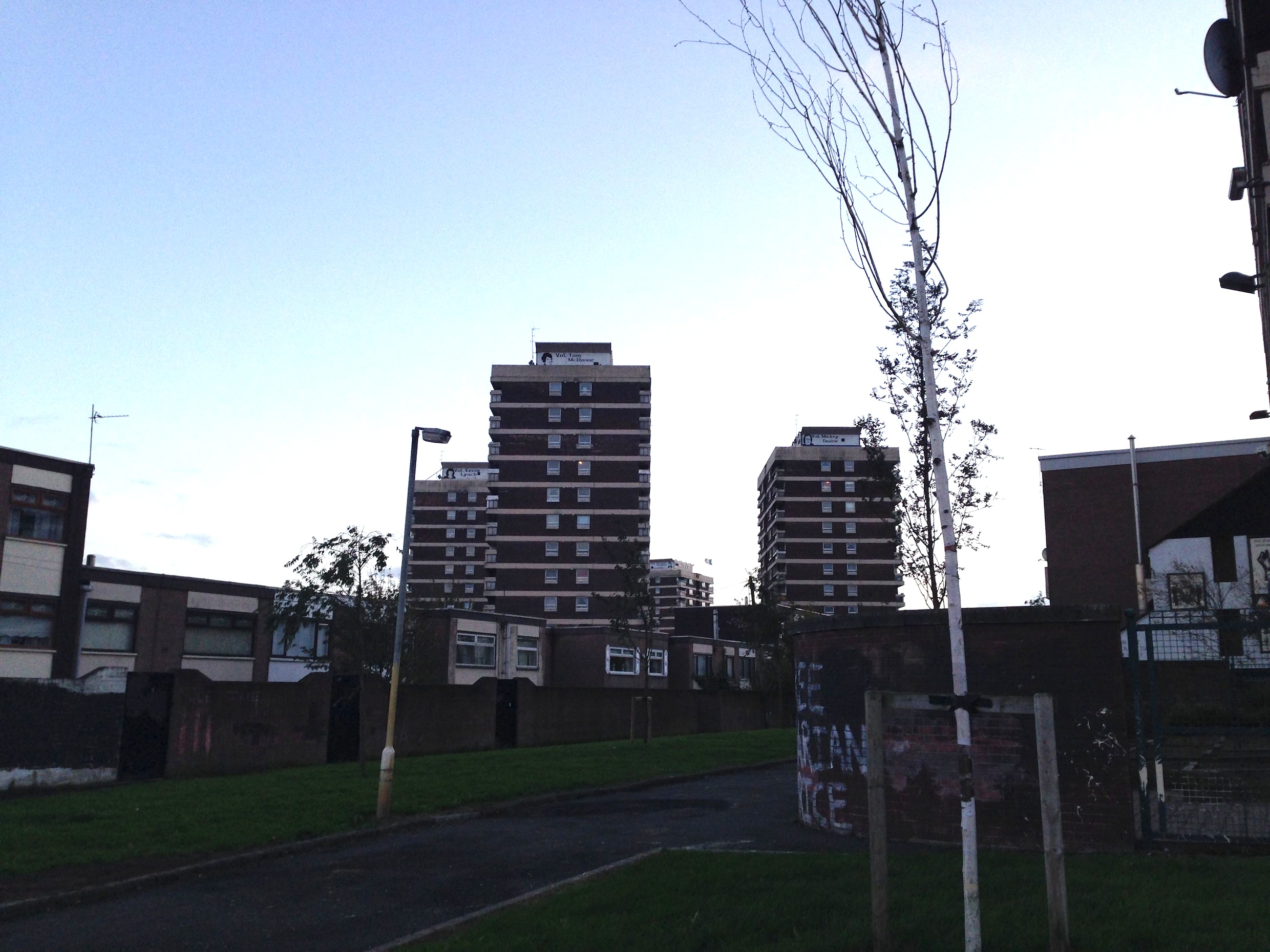
The New Lodge towers, Belfast, October 2013.
The nightlife and pub-life of the city is today indistinguishable from Bristol or Birmingham, or, for that matter, Dublin’s custom-built Temple Bar. We all live, more or less, in the same post-modern heaven. Gerald Dawe (p. 201)
Now the birds no longer try to come into the house.
I see them fly high in the clear sky from my terrace.
Finally I saw them from outside, numerous. Perhaps they would like to come inside to console the patients. They glide around the pain and perch above those rooms. That’s what that noise was that bothered me so much at the time. Their little feet on those roofs. But that’s their way of not letting us slide away: they reassure life.
